By Cari Wade Gervin
The Breast Surgery Program at White Plains Hospital Center for Cancer Care offers life-prolonging surgery and exemplary aesthetic outcomes, all provided in an environment of compassionate care.
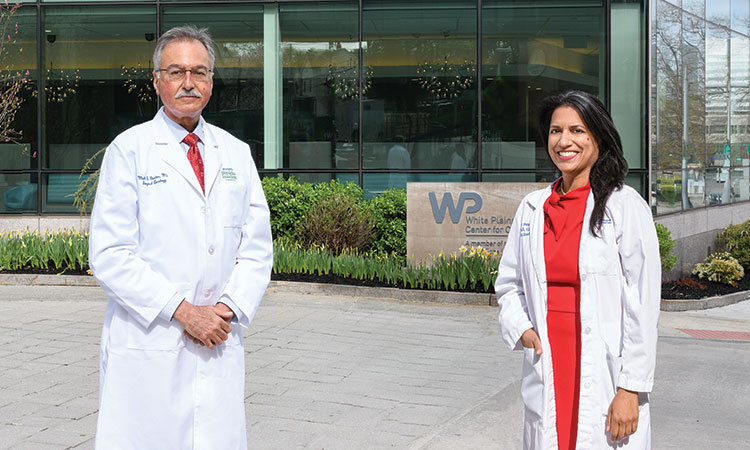
No woman wants to be told she has breast cancer, but statistically, 1 in 8 women will hear that diagnosis. It’s a conversation that will raise concerns about treatment options, life expectancy and quality of life going forward. White Plains Hospital Center for Cancer Care has the expertise to guide women from an initial breast-cancer diagnosis through treatment and recovery.
For the majority of patients diagnosed with breast cancer, physicians will recommend some form of breast surgery in addition to chemotherapy or radiation — typically either a mastectomy or breast-conserving surgery (BCS, or lumpectomy). Depending on the type and stage of cancer, lymph nodes may also be removed along with the cancerous breast tissue.
Operating on the breast requires more than just tumor removal. Many patients want to spare their breast shape, ability to experience sensation in the breast, and/or ability to breastfeed. White Plains Hospital Center for Cancer Care strives to make these aspirations a reality whenever possible.
“Most women are candidates for breast conservation,” says Preya Ananthakrishnan, MD, FACS, Director of Breast Surgery at White Plains Hospital Center for Cancer Care. “As much as possible, we’ll do whatever we can to preserve their breasts and have the surgery be minimally impactful on their quality of life.”

A Personalized Team Approach
White Plains Hospital renovated and expanded its Center for Cancer Care almost five years ago. The center provides personalized cancer treatment, along with access to clinical trials and leading-edge research. Services include medical oncology, surgical oncology, chemotherapy and biotherapy, radiation oncology, genetic counseling, and diagnostics.
“I think what makes our program special and exceptional are the people who work here,” says Mark Gordon, MD, FACS, Surgical Director of White Plains Hospital Center for Cancer Care. “And to add to that, our cancer center is really aesthetically beautiful. Our patients appreciate it. It’s modern and designed to be very soothing for our patients.”
Dr. Gordon has worked at White Plains Hospital for 32 years and has been the Surgical Director since 2013. He was instrumental in the creation of the Center for Cancer Care and helped bring in Dr. Ananthakrishnan to run the breast surgery program.
“We’re all in the same building, so we have access to one another, and it just translates into really good patient care because we’re constantly talking with each other — whether by phone, text, email or in person — about individual patients and the specific aspect of the care that they’re currently undergoing,” Dr. Gordon says. “I think, as a result, our patients feel more of a connection. I think they feel that they’re not just a number. They’re not just a disease.”
The entire oncology team meets weekly to discuss patients’ cases and care protocols to ensure everyone is in sync and coordinating care.
“I think what underscores every decision we make is, ‘How would we treat our own family member?’” Dr. Ananthakrishnan says. “I’ve been at a lot of big institutions, and I think what we have to offer is just that extra little bit of love and TLC to get a patient through this tough time, in addition to our world-class surgical and oncologic care.”
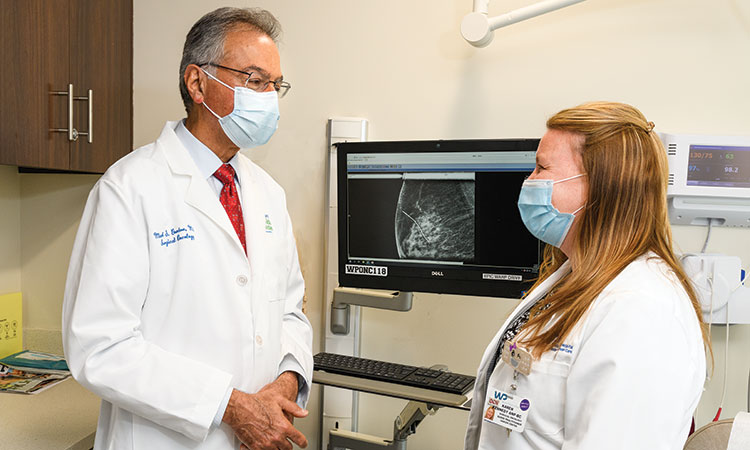
Involved, Accessible Care
The White Plains Hospital Center for Cancer Care doesn’t just loop in its entire team, it also takes specific steps to make sure a patient’s primary care physician is up to date.
“We let them know what’s going on with the patient,” Dr. Ananthakrishnan says. “We make sure that they get copies of all our notes, and we keep them informed with the plans. Really, we work together.”
This collaborative approach is unlike some other practices that assume specialists always know best.
“Patients have a lifelong relationship with their primary care doctors, and they’re an integral part of the team,” Dr. Ananthakrishnan says. “They have known the patient for much longer than we have, so a lot of times they can give us insight into circumstances at home that might impact patients, whether it’s decision-making or compliance.”
This level of communication is especially important given that an increasing number of patients aren’t coming from Westchester County and New York but also from New Jersey, Connecticut and upstate.
“At White Plains Hospital, we have an institutional commitment to constantly refine and enhance our techniques and treatment options for patients.”
— Mark Gordon, MD, FACS, Surgical Director of White Plains Hospital Center for Cancer Care
The Forefront of Breast Conservation Surgery
In recent years, the treatment protocol for breast cancer has changed to provide the option of breast conservation surgery for a majority of patients.
“When one performs a lumpectomy, one is preserving the breast, but one must try to preserve a breast in such a way that it looks cosmetically appealing and is symmetric,” Dr. Gordon says. “We’re very sensitive and aware of that. We can place incisions in certain places so our patients and other people won’t even see them.”
Often, a lumpectomy procedure is followed by plastic surgery to provide the best outcome.
“While preserving life and health is our primary goal, we also try to make sure that patients are happy with the cosmetic outcome as well as the oncologic outcome,” Dr. Ananthakrishnan says. “We do a lot of combined cases where we can perform a lumpectomy combined with a breast reduction and lift. The patient sometimes ends up with cosmetic results that are actually better than what they started out with.”
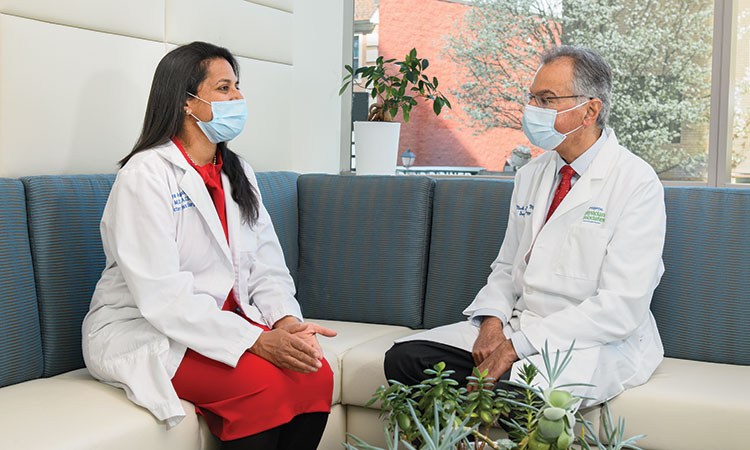
Minimally Invasive Techniques for Mastectomy
Lumpectomy procedures aren’t the only thing that have changed as breast cancer research and protocols have progressed. Mastectomies were once maximally invasive, often removing unnecessary chest muscle, and performed with little thought to nipple preservation. But advances in technology and changes in thinking have changed mastectomies, and the White Plains Hospital Center for Cancer Care is at the forefront of the new techniques.
“When appropriate, we perform a nipple-sparing or a minimally invasive mastectomy, typically through an incision at the lower breast where the fold of the breast meets the abdomen,” Dr. Gordon says. “By doing that, we create a limited scar that typically will not be seen, and we can leave a breast that looks like a normal breast. We typically work in conjunction with our plastic surgeons, who use a variety of techniques to reconstruct the breast, either using the patient’s own tissue or implantable devices.”
An important part of this reconstruction involves placing implants in front of the chest wall muscle, which decreases the amount of pain the patient experiences and renders the surgical process more efficient, with fewer stages needed.
“For certain patients, our plastic surgeons are able to perform an implant reconstruction as a single-stage procedure, so the patient can have their full reconstruction in one day at the time of their mastectomy,” Dr. Ananthakrishnan says. “I think that’s where our team at White Plains really shines.”
The surgeons also utilize anesthetic blocks to lessen post-operative pain — and thus decrease the need for painkillers after surgery.
“The idea of a nerve block is that when a woman awakens from anesthesia, she shouldn’t have pain,” Dr. Gordon says. “And that allows her to take deep breaths, allows her to get out of bed and hastens the recovery. We think this is an important part of care and an important part of our patients’ overall surgical experience.”
“We really want women to be able to return to their baseline function as quickly as possible, with no limitation or restriction on movement or activity,” Dr. Ananthakrishnan says.
Preya Ananthakrishnan, MD, FACS
Preya Ananthakrishnan, MD, FACS, is the Director of Breast Surgery at White Plains Hospital Center for Cancer Care. A graduate of the University of Louisville School of Medicine, Dr. Ananthakrishnan completed her residency at the University of Medicine and Dentistry in Newark, New Jersey, followed by a fellowship at the John Wayne Cancer Institute in Santa Monica, California. Before joining White Plains Hospital almost five years ago, Dr. Ananthakrishnan served on the faculty of the Cleveland Clinic and Columbia University College of Physicians and Surgeons and was Director of the Breast Surgery Fellowship at Columbia.
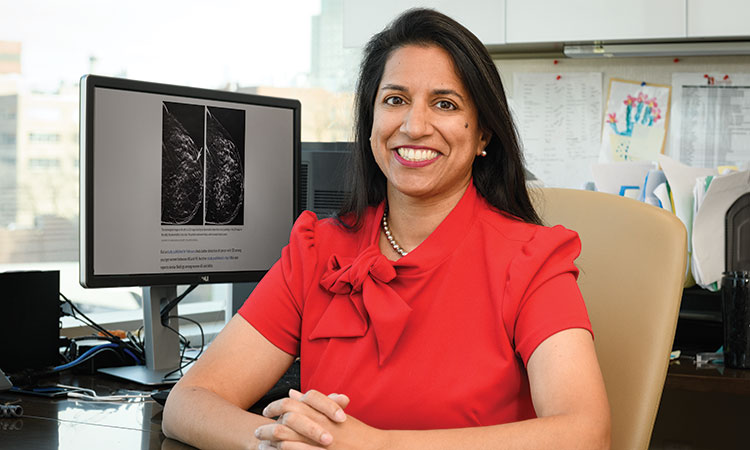
All Additional Services On-Site
While having an entire oncology team in the building ensures surgery, radiation and chemotherapy protocols all happen in coordination, the White Plains Hospital Center for Cancer Care Breast Health Program provides multiple other medical services on-site, including physical therapy.
“One of the worries of our patients is that they may experience some functional impairment, especially when we sample or biopsy lymph nodes from the armpits,” Dr. Gordon says. “So we’re starting a new program called prehabilitation, working with our patients preoperatively to make sure they have a proper range of motion in their arms and shoulders, which should translate into postoperative full range of motion and a faster recovery.”
There is also a geneticist to provide testing and counseling, along with a holistic nursing team offering massage, Reiki and acupuncture. A social worker provides counseling for patients who need it, and a nutritionist helps patients understand dietary changes that may come with cancer and chemotherapy.
“We feel that it enhances our program to have somebody physically available to communicate with our patients on the spot,” Dr. Gordon says. “One of the hallmarks of our program is that we make our staff members readily accessible to patients, whether by phone or email.”
Mark Gordon, MD, FACS
Mark Gordon, MD, FACS, is the Surgical Director of the White Plains Hospital Center for Cancer Care. A surgical oncologist who attended Northwestern University Medical School and completed his general surgery residency at The New York Hospital-Cornell University Medical Center, now known as New York-Presbyterian/Weill Cornell Medical Center, Dr. Gordon has been on staff at White Plains Hospital for 32 years. He also completed a fellowship in Surgical Oncology at Memorial Sloan-Kettering Cancer Center and has served as an instructor of surgery at the New York Hospital-Cornell University Medical Center and as a clinical assistant professor of surgery at Cornell University Medical College.
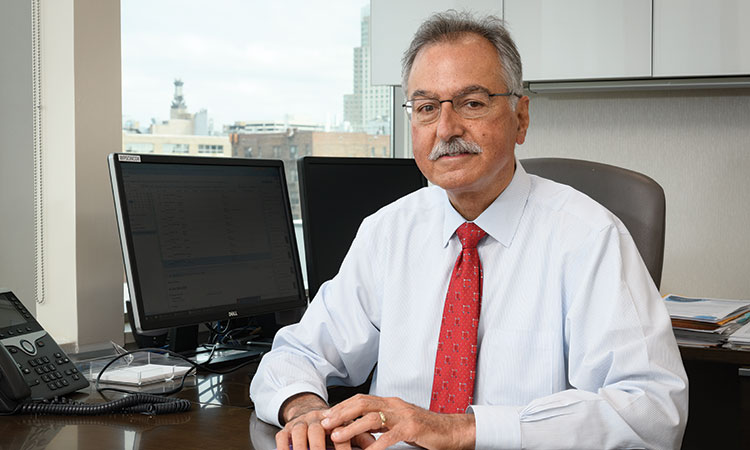
Ongoing Access to Clinical Trials
The White Plains Hospital Center for Cancer Care Breast Program has full accreditation designation by the National Accreditation Program for Breast Centers.
“In order to get this designation, a program has to go through rigorous evaluation and review,” Dr. Gordon says. “We have to be a comprehensive center — defined as having a complete range of state-of-the-art services and equipment — and we have to demonstrate that we have a team approach to breast cancer, and that we’re providing our patients with the best available treatment options, including ongoing clinical trials and evolving treatment plans.”
There are currently nine clinical trials relating to breast cancer underway at the hospital. Every new patient’s case is assessed by a physician and the clinical trials coordinator as to whether or not the individual patient is eligible.
“With clinical trials, you ask, ‘Is this the best treatment for this patient? Is this the treatment that will provide the best chance of cure? What are the potential side effects? Is there a drug that offers a better survival advantage or is there a drug that causes less toxicity?’” Dr. Gordon says. “We’re constantly weighing curative treatments versus the potential side effects that our patients will experience.”
Clinical trials relating to COVID-19 have been front-page news over the past year, and Dr. Ananthakrishnan hopes the impact of the vaccine research will encourage more patients to sign up.
“Really, all the advances in breast cancer have been made due to the courageous patients who have participated in clinical trials,” Dr. Ananthakrishnan says. “The benefit of clinical trials is that patients get access to the latest and the greatest treatments right from the get-go.”
“Placing breast implants above the pectoral muscles has really made a difference in our patients’ functionality after surgery. In the past, with the implant behind the muscle, patients often experienced pain or impaired mobility. It could take months to get back to their baseline function. But now, with the plastic surgeon placing the implant in front of the pectoralis muscle, patients can return to a full range of movement more quickly. For example, one patient, a teacher, returned to her online classroom just four days after her surgery.”
— Preya Ananthakrishnan, MD, FACS, Director of Breast Surgery, White Plains Hospital Center for Cancer Care
Continuing Care During COVID-19
The pandemic has not brought an end to cancer diagnoses, and the White Plains Hospital Center for Cancer Care has pivoted to protect both patients and staff.
“We do allow family members to come for a new consultation,” Dr. Gordon says. “We think it’s very important for our patients to bring one family member with them, because the diagnosis and treatment of breast cancer is overwhelming.”
“I think our caution has allowed our patients to feel more comfortable coming to see us,” Dr. Gordon says.
Still, the changes haven’t always been easy. The addition of extra personal protective equipment for both medical staff and patients has presented its own challenges, on top of the ongoing shortage.
“Honestly, it’s hard for our patients,” Dr. Ananthakrishnan says. “New patients don’t really know what I look like, and I don’t really know what they look like. That’s a challenge in itself because as oncologists, we get so many cues about how a patient is feeling by looking at their face and reading their facial expressions.”
Surgeries have had to be scheduled and rescheduled on the fly after patients have tested positive for COVID-19, and patients have also struggled with being unable to have family members visit after surgery.
“We do facilitate video calls with family members as much as possible,” Dr. Ananthakrishnan says. “I can’t tell you how proud I am of our staff and our team, because everybody has just been going above and beyond to try to make sure that the patients are comfortable and have a good experience.”
Throughout the challenges of the past year, the team has tried to stay positive and maintain a sense of humor to help boost patients’ spirits.
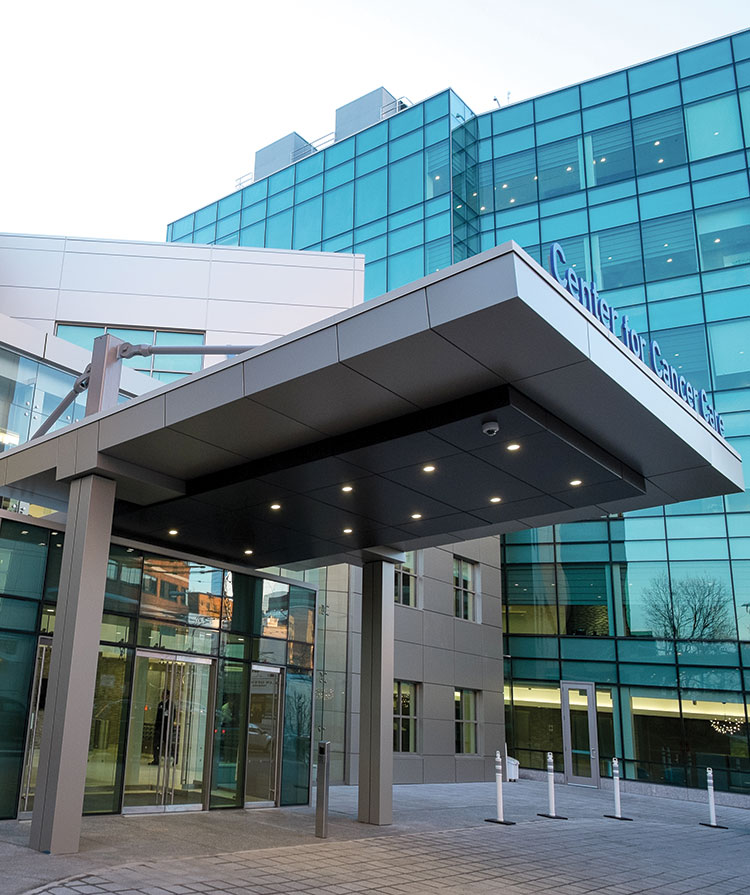
For more information, please visit wphospital.org/breastcancer.
Source: MD News April/May 2021, Lower Hudson/Bronx Edition
